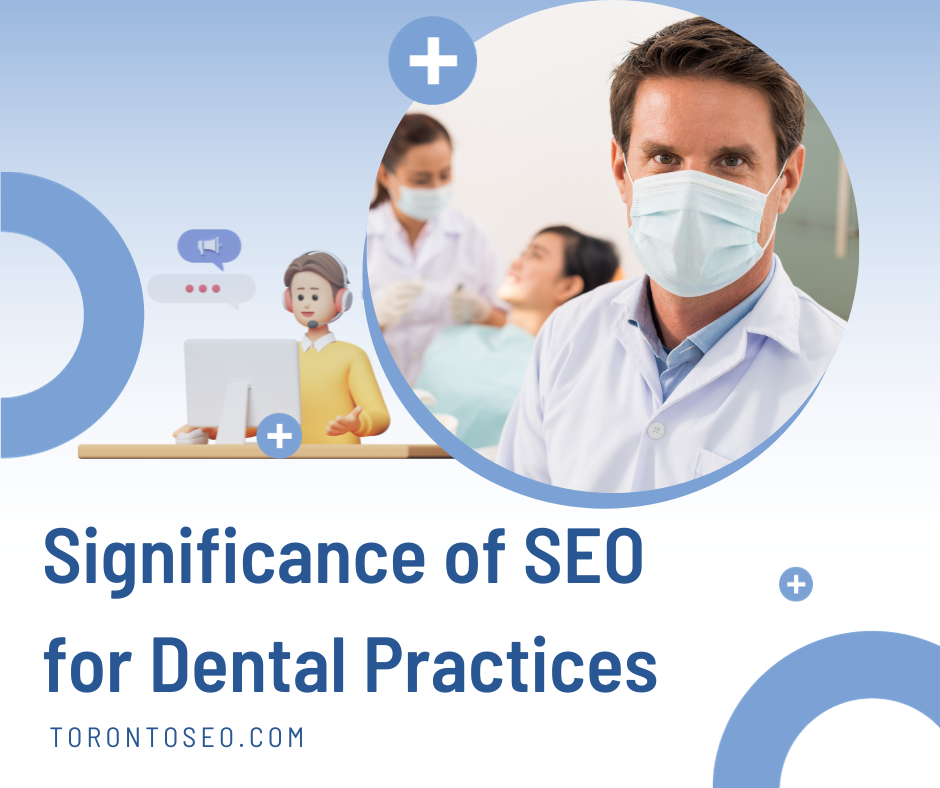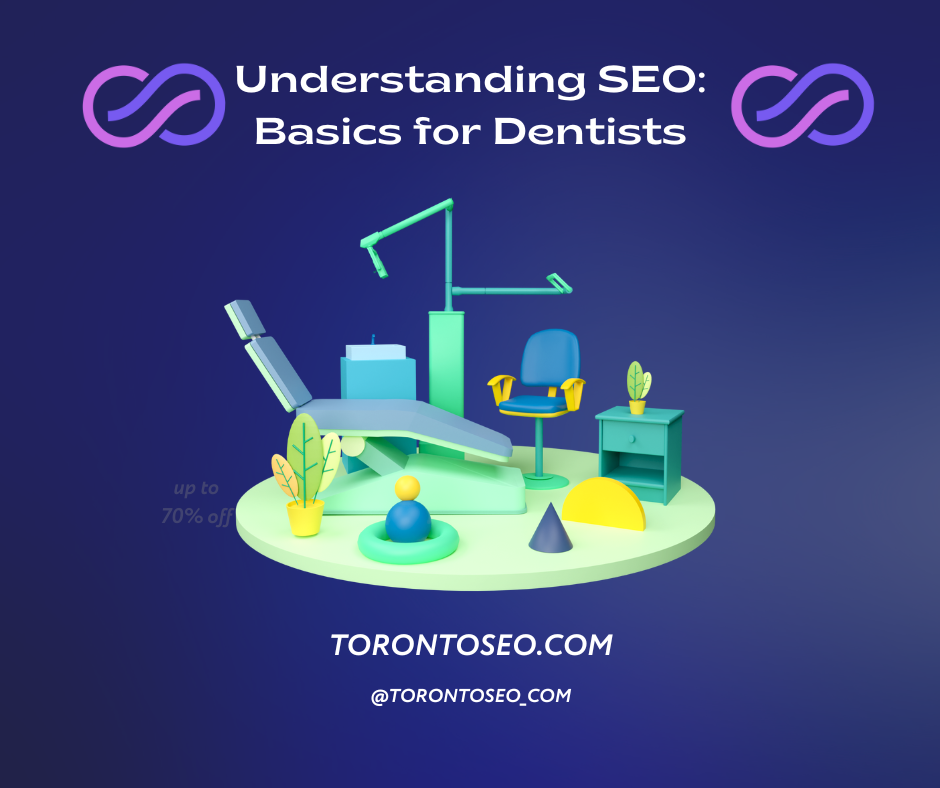SEO Services for Dentists in Toronto: Enhancing Online Visibility
The Significance of SEO for Dental Practices
The dental industry in Toronto is highly competitive, with numerous practices vying for the attention of a limited patient base. In such a densely populated and competitive market, standing out becomes not just an advantage, but a necessity for survival and growth. This is where the power of Search Engine Optimization (SEO) comes into play.
The Competitive Landscape of Dental Services in Toronto
Toronto’s dental market is saturated with clinics offering a wide range of services. From general dentistry to specialized treatments, each practice seeks to attract and retain patients. However, with so many options available, patients often turn to search engines like Google to find their preferred dental service provider. This behavior underscores the need for dentists to enhance their online visibility to be easily found by potential patients.
In Toronto, where urban lifestyles heavily rely on digital solutions, a significant number of patients use online searches to make healthcare decisions, including choosing a dentist. A dental practice that appears at the top of search engine results is more likely to be perceived as trustworthy and reputable, factors that heavily influence patient choices.
The Role of SEO in Standing Out
SEO is much more than just a digital marketing tool; it’s a fundamental element for business growth in the digital age, especially for service-oriented sectors like dentistry. Effective SEO strategies can transform the online presence of a dental practice. Here’s how:
- Increased Visibility in Search Results: By optimizing your website with relevant keywords, particularly those related to dental services in Toronto, your practice can rank higher in search engine results pages (SERPs). This increased visibility means your clinic is more likely to be seen by individuals actively searching for dental services in your area.
- Targeting the Right Audience: SEO isn’t just about attracting more traffic; it’s about attracting the right traffic. By using specific, localized keywords and creating content relevant to your target audience’s needs and concerns, you draw in potential patients who are more likely to convert into actual patients.
- Establishing Authority and Trust: A well-optimized website with quality content, such as informative blog posts about dental health, FAQs about dental procedures, or patient testimonials, helps establish your practice as an authoritative and trustworthy source of information. This not only improves your search engine rankings but also builds trust with potential patients.
- Enhancing User Experience: SEO isn’t just about pleasing search engines; it’s equally about providing a great user experience. A website that is easy to navigate, fast-loading, and mobile-friendly keeps visitors engaged and reduces bounce rates, which are positive signals to search engines.
- Long-term Patient Acquisition Strategy: Unlike paid advertising, the benefits of SEO are long-term. With continuous optimization efforts, your dental practice can maintain high visibility in search results, ensuring a steady influx of new patients over time.
For dental practices in Toronto, investing in SEO is not just a marketing decision but a strategic move to stay relevant and competitive. Effective SEO strategies help dental practices stand out in search engine results, drawing in more patients and ultimately contributing to the growth and success of the practice. This digital era demands more than just traditional marketing methods; it requires a smart, SEO-driven approach to reach and engage with the modern patient,
Understanding SEO: Basics for Dentists
Search Engine Optimization (SEO) is a crucial tool in the digital marketing arsenal, especially for dentists looking to increase their online presence in a competitive market like Toronto. At its core, SEO is about enhancing your website’s visibility in search engine results, making it easier for potential patients to find you when they search for dental services online.
What is SEO and How Does it Work?
SEO is a set of practices designed to improve the ranking of a website on search engines like Google. The higher your website ranks, the more visible it becomes to people searching for the services you offer. Essentially, SEO is about speaking the language of search engines. This involves optimizing various elements of your website so that search engines can easily understand what your site is about and how it should rank in search results.
The process of SEO involves several key components:
- Keywords: These are words or phrases that potential patients use when searching for dental services. For example, “best dentist in Toronto” or “teeth whitening services Toronto.” By incorporating these keywords into your website’s content, you increase the chances of your site appearing in relevant search results.
- Local SEO: For dental practices, local SEO is particularly important. This involves optimizing your website to rank well for searches in a specific geographic area – in this case, Toronto. Elements of local SEO include listing your practice on Google My Business, optimizing for location-specific keywords, and ensuring your practice’s address and contact information are consistently listed across the web.
- Content Creation: Quality content is a cornerstone of good SEO. For dentists, this might include informative blog posts about dental health, detailed descriptions of services offered, or educational videos. This content should not only be engaging and informative for readers but also optimized with relevant keywords.
- Website Optimization: This involves ensuring that your website is user-friendly, mobile-responsive, and fast-loading. Search engines favor websites that provide a good user experience. This includes having a well-structured site with clear navigation, optimizing image sizes for faster loading, and ensuring your site is accessible on various devices.
Understanding and implementing these basic components of SEO can significantly impact the online visibility of your dental practice. It’s about making your website appealing both to search engines and to the potential patients who use them. In today’s digital-driven world, a strong online presence is essential for any dental practice looking to attract new patients and grow its business. By mastering these SEO basics, you can set your practice on the path to increased online visibility and success.
Local SEO: A Game Changer for Toronto Dentists
In the digital landscape, Local SEO has emerged as a critical strategy for businesses seeking to capture the attention of a local audience – and for Toronto dentists, it’s no different. Local SEO is about optimizing your online presence to attract more business from relevant local searches. This approach is particularly important for dentists in Toronto, as it directly targets potential patients in their immediate geographical area.
Why Local SEO Matters for Dentists in Toronto
Local SEO is crucial for dentists because when people seek dental services, they often look for convenient options near them. For instance, a search query like “dentist near me” or “best dentist in downtown Toronto” is common. Google and other search engines prioritize local businesses in these search results, which is where Local SEO comes into play.
By optimizing for local searches, dentists in Toronto can significantly increase their visibility among potential patients in their vicinity. This not only helps in attracting new patients who are actively seeking dental services but also aids in building a strong local presence.
Key Aspects of Local SEO for Dentists
- Google My Business (GMB) Optimization: One of the most important steps in Local SEO is setting up and optimizing your Google My Business profile. This is a free listing that allows your dental practice to appear in local search results and Google Maps. It’s essential to provide accurate and comprehensive information, including your practice’s name, address, phone number, hours of operation, and services offered.
- Local Keywords: Incorporating local keywords into your website’s content is crucial. Keywords such as “Toronto dentist” or “dental services in Toronto” help search engines understand the local relevance of your website. These should be naturally integrated into your website’s content, meta descriptions, and titles.
- Consistent NAP Citations: NAP stands for Name, Address, and Phone number. Ensuring this information is consistent across all online platforms (like social media, directories, and your website) is crucial for Local SEO. Inconsistencies can confuse search engines and potential patients.
- Local Link Building: Building links from other local businesses and websites can bolster your local SEO efforts. This could include partnerships with local healthcare providers, dental suppliers in Toronto, or community organizations.
- Patient Reviews and Testimonials: Encouraging patients to leave reviews, especially on your Google My Business profile, can significantly enhance your local search visibility. Positive reviews not only improve your rankings but also build trust with potential patients.
- Localized Content Creation: Creating content that speaks directly to your Toronto audience can help in local search rankings. This could include blog posts about local dental health concerns, news about your practice’s participation in local events, or information about services that are particularly relevant to Toronto residents.
For dentists in Toronto, mastering Local SEO is not just an option but a necessity in today’s internet-driven world. It’s a powerful tool that can set your practice apart in a crowded market, helping you reach potential patients right in your community. By focusing on these key elements of Local SEO, you can significantly improve your practice’s online visibility, attract more local patients, and establish a strong presence in the Toronto dental market.
Keyword Research: Targeting the Right Audience
For dentists in Toronto, understanding and implementing effective keyword research is pivotal in reaching the right audience. Keyword research is the process of identifying the terms and phrases potential patients are using to search for dental services online. This step is a foundational element of SEO, guiding the content strategy and ensuring your website aligns with user search intent.
The Importance of Targeted Keywords for Dental Practices
The right keywords act as a bridge connecting your dental practice with people actively seeking dental services in Toronto. For instance, a potential patient might search for “emergency dental care Toronto” or “teeth whitening services in Toronto.” If your website is optimized for these specific terms, it’s more likely to appear in search results for these queries, increasing the likelihood of attracting patients who need the services you offer.
How to Conduct Keyword Research for Dental Services
- Understanding Patient Search Habits: Start by thinking like a patient. What dental issues or services might they search for online? This perspective helps in identifying relevant keywords.
- Utilizing Keyword Research Tools: Tools like Google Keyword Planner, SEMrush, or Ahrefs can provide insights into the most searched terms related to dental services in Toronto. These tools offer data on keyword volume, competition, and related search queries.
- Analyzing Competitors: Look at what keywords your competitors in Toronto are targeting. This can give you an idea of what’s working in your market and help identify any gaps in your own keyword strategy.
- Incorporating Local Keywords: Since you’re targeting a Toronto-based audience, include local keywords. Phrases like “Toronto dental clinic” or “North York family dentist” are examples of how you can localize your SEO efforts.
- Long-tail Keywords: These are longer and more specific keyword phrases. They might have a lower search volume but can attract more qualified traffic. For example, “pediatric sedation dentistry in Toronto” is a long-tail keyword that targets a specific audience.
- Evaluating and Updating Keywords: Keyword trends can change, so it’s important to periodically review and update your keywords. This ensures your SEO strategy remains relevant and effective.
Integrating Keywords into Your Online Presence
Once you have identified your keywords, integrate them into various elements of your website and online content. This includes your website’s text, titles, meta descriptions, blog posts, and even in the alt text of images. The goal is to use these keywords naturally and contextually, aligning with the way potential patients would search for your services.
FAQ: SEO for Dental Practices in Toronto
1. Why is SEO important for dental practices in Toronto?
- SEO is crucial for dental practices in Toronto due to the competitive nature of the industry. It helps practices stand out in search engine results, making them more visible to potential patients searching online.
2. How does SEO benefit a dental clinic in Toronto?
- SEO increases a clinic’s online visibility, targets the right audience, establishes authority and trust, improves user experience, and provides a long-term patient acquisition strategy.
3. What are the key components of effective SEO for dentists?
- Key components include targeted keyword research, local SEO optimization, high-quality content creation, website optimization for user experience, and mobile responsiveness.
4. What is Local SEO and why is it important for Toronto dentists?
- Local SEO optimizes a practice’s online presence for local searches, making it more visible to potential patients in the immediate geographical area. It’s important because many patients look for convenient local options.
5. How can dentists in Toronto optimize their website for SEO?
- Dentists can optimize their website by using relevant local keywords, ensuring mobile responsiveness, creating quality content, and maintaining a fast-loading, user-friendly website.
6. What role do patient reviews play in SEO for dentists?
- Patient reviews, especially on Google My Business profiles, enhance local search visibility, improve search engine rankings, and build trust with potential patients.
7. How should dentists conduct keyword research for their SEO strategy?
- Dentists should understand patient search habits, use keyword research tools, analyze competitors, incorporate local keywords, and consider long-tail keywords.
8. How does social media integration affect a dental practice’s SEO?
- Social media platforms can complement a dental practice’s SEO efforts by increasing online presence and engagement, thus supporting overall digital marketing strategies.
9. Why is regular monitoring and adaptation of SEO strategies important?
- Regular monitoring using tools like Google Analytics is vital to understand SEO performance and to make necessary adjustments for continuous improvement and effectiveness.
10. How can a dental practice in Toronto get started with SEO?
- Dental practices can start by assessing their current online presence, conducting keyword research, optimizing their website, and considering professional SEO services for personalized strategies.
In conclusion, the article “SEO Services for Dentists in Toronto: Enhancing Online Visibility” underlines the essential role of Search Engine Optimization (SEO) in the highly competitive dental industry of Toronto. SEO emerges not merely as a marketing tool but as a fundamental strategy for dental practices to navigate and succeed in the digital landscape. It emphasizes the need for dental clinics to enhance their online visibility to effectively reach and engage potential patients.
The crux of the article lies in illustrating how SEO helps dental practices in various ways: by increasing their visibility in search engine results, targeting the right audience, establishing trust and authority, enhancing user experience, and offering a long-term strategy for patient acquisition. The importance of local SEO, particularly in a city like Toronto, is highlighted as a game-changer, enabling dentists to attract more patients from their immediate geographical area.
Moreover, the article provides valuable insights into the different aspects of SEO, including keyword research, local SEO, content creation, website optimization, and the integration of social media. It emphasizes the importance of understanding patient search habits, utilizing keyword research tools, and keeping content both relevant and engaging.
The article concludes by stressing the need for regular monitoring and updating of SEO strategies to ensure they remain effective and align with current search trends. In essence, for Toronto dentists, adopting a comprehensive, SEO-driven approach is not just a choice but a necessity to remain relevant, visible, and competitive in the evolving digital era. This strategy is crucial for connecting with the modern patient and ensuring the growth and success of their dental practices.








